Related Research Articles
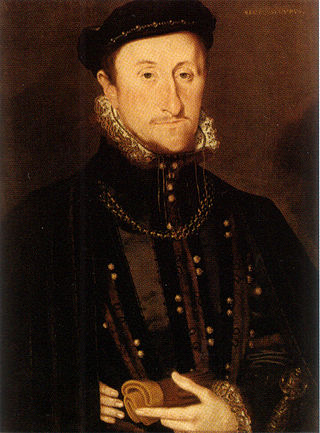
James Stewart, 1st Earl of Moray was a member of the House of Stewart as the illegitimate son of King James V of Scotland. At times a supporter of his half-sister Mary, Queen of Scots, he was the regent of Scotland for his half-nephew, the infant King James VI, from 1567 until his assassination in 1570. He was the first head of government to be assassinated with a firearm.

Marquess of Londonderry, of the County of Londonderry, is a title in the Peerage of Ireland.
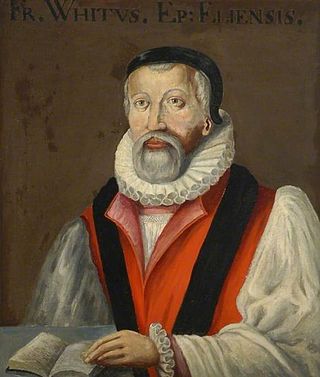
Francis White was an English bishop and controversialist.

Thomas Percy, 7th Earl of Northumberland, 1st Baron Percy, KG, led the Rising of the North and was executed for treason. He was later beatified by the Catholic Church.

Matthew Hutton (1529–1606) was archbishop of York from 1595 to 1606.
Charles Neville, 6th Earl of Westmorland was an English nobleman and one of the leaders of the Rising of the North in 1569.
The Rising of the North of 1569, also called the Revolt of the Northern Earls or Northern Rebellion, was an unsuccessful attempt by Catholic nobles from Northern England to depose Queen Elizabeth I of England and replace her with Mary, Queen of Scots.

George Henry Robert Charles William Vane-Tempest, 5th Marquess of Londonderry, KP, styled Viscount Seaham between 1823 and 1854 and known as The Earl Vane between 1854 and 1872, was a British aristocrat, businessman, diplomat and Conservative politician.
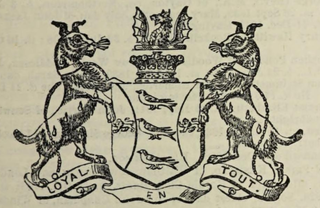
Sir Valentine Browne, of Croft, Lincolnshire, was auditor, treasurer and victualler of Berwick-upon-Tweed. He acquired large estates in Ireland during the Plantation of Munster, in particular the seignory of Molahiffe. He lived at Ross Castle near Killarney, County Kerry. He was MP in three English and one Irish parliaments.
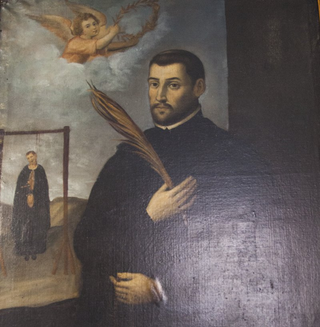
Thomas Palasor was an English Roman Catholic priest. He is a Catholic martyr, beatified in 1987.

Sir Henry Vane-Tempest, 2nd Baronet was a British politician. In early life his name was Henry Vane. He changed his name to Vane-Tempest when he inherited from his uncle John Tempest, Jr. in 1793.
Holmside Hall is an early 19th-century farmhouse and equestrian centre at Holmside, Burnhope, County Durham, England.
John Tempest Jr. was a County Durham landowner and Tory politician who sat in the House of Commons from 1768 to 1794.
John Tempest was an English politician, elected as the first Member of Parliament for the County of Durham on 21 June 1675.
William Tempest was a Member of Parliament and a member of the Tempest family of Old Durham. The son of John Tempest and Elizabeth, the sole heiress of John Heath, he represented the City of Durham as Member of Parliament in 1678, 1680 and 1689. He was a defeated candidate in the elections of 1675,1679 and 1688.

The Tempest family was an English recusant family that originated in western Yorkshire in the 12th century.
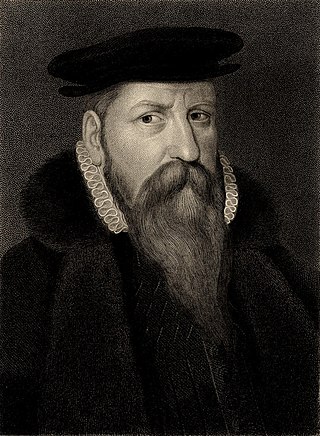
Sir George Bowes was an English military commander.

Robert Glover was an English officer of arms, genealogist and antiquarian in the reign of Elizabeth I. In the College of Arms, he rose to the rank of Somerset Herald of Arms, serving in that capacity from 1571 until his death in 1588. As marshal and deputy to his father-in-law, William Flower, Norroy King of Arms, he participated in heraldic visitations throughout northern England.
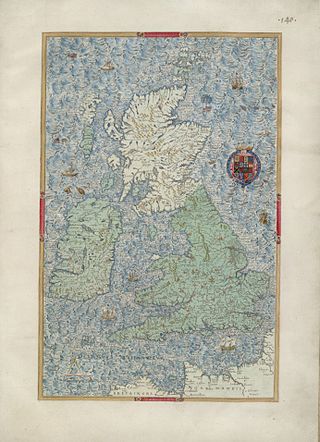
William Bowyer was an antiquary and government official who was a Member of Parliament and Keeper of the Records in the Tower of London early in the reign of Elizabeth I of England. He was the first Keeper to systematically organise and catalogue the store of government records maintained in the Tower. An avid collector of old manuscripts, he also created Heroica Eulogia, a compilation of grants and verse eulogies relating to the earls of Leicester, along with satirical verses and illustrations, for presentation to Robert Dudley, Earl of Leicester.
William Russell (1734–1817) was an English merchant, coal-fitter and banker. He first went into business as a merchant in Sunderland. He then made a substantial personal fortune from coal mining.